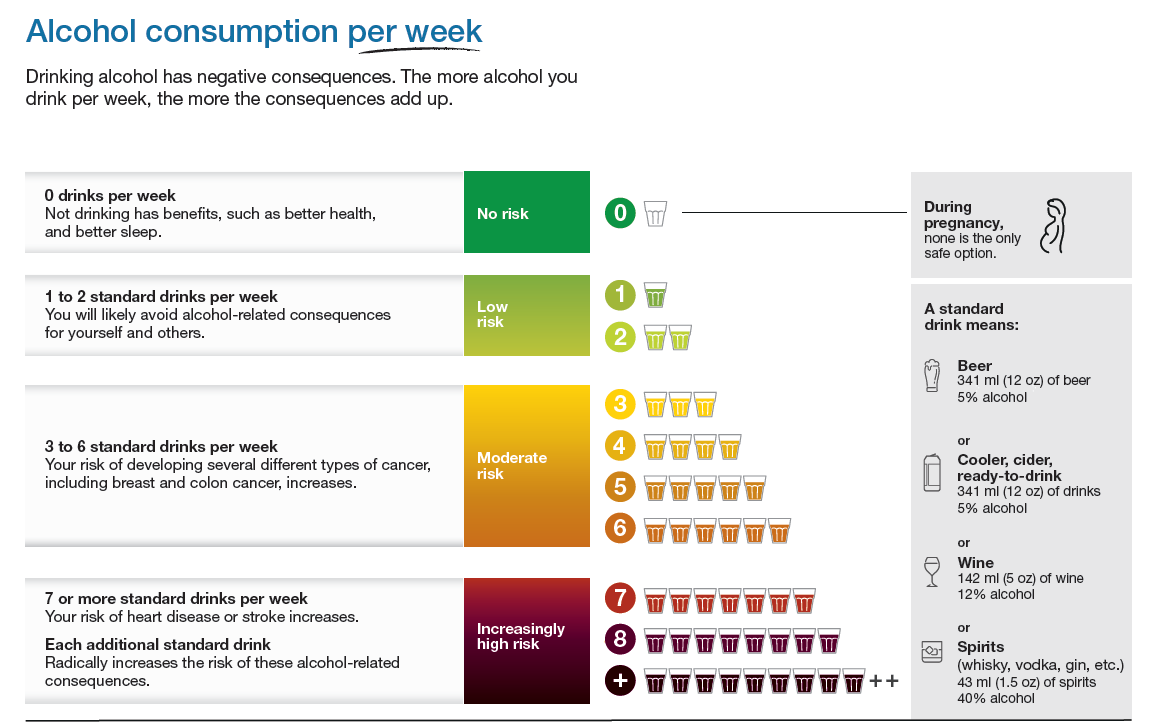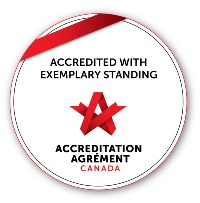Avoid alcohol
EN | FR
What is alcohol?
Alcohol is a toxic substance that affects the way we think and behave. It is a depressant that provides a sense of relaxation by slowing down our heart rate, breathing, brain functions, thoughts, and actions. People consume alcohol in drinks such as beer, wine, spirits, and cider. Even though it is legal, alcohol can have harmful health effects.

What are the benefits of avoiding alcohol?
Avoiding alcohol can provide lots of benefits and can help boost your mood and general health. The way alcohol affects your body depends on factors such as your body weight, your sex, your age, the amount you drink, your past drinking experience, and your overall health.
Avoiding or even limiting alcohol can help reduce short-term risk and long-term risk of poor health. Some of the benefits include:
- improved mental health
- improved energy levels
- better sleep
- better long-term physical health
- reduced risk of heart disease and high blood pressure
- reduced risk of a variety of cancers
Which cancers can be prevented?
Drinking alcohol frequently can increase the risk of cancers of the liver, breast, mouth, throat, colon, and stomach. Evidence shows that the more alcohol a person regularly drinks, the higher their risk of getting an alcohol-associated cancer. As an example, we can prevent around 1,000 cancer cases in 2038 if all Manitobans avoid alcohol, starting today.
What can you do?
For cancer prevention, it is best not to drink any alcohol.
To help reduce your risk of cancer, drink less than two standard drinks a week. The more you drink, the greater your risk. For more information, visit Canada's guidance on alcohol and health.
The definition of a standard drink can vary based on the type of alcohol you are consuming. In Canada, a standard drink is 17 milliliters (ml) or 13.5 grams of pure alcohol, which is comparable to:
- A bottle of beer or cider (12 oz., 341 ml, 5% alcohol). A can of pop is usually 355 ml and often beer is served in glasses, bottles or king cans that exceed 1 standard drink size.
- A glass of wine (5oz., 143 ml,12% alcohol). A juice box is usually 120 ml and often wine is poured in larger volumes that exceed 1 standard drink size.
- A shot glass of spirits (1.5 oz., 43 ml, 40% alcohol)
Do not drink when you are:
- pregnant or planning to be pregnant
- driving a vehicle or using machinery and tools
- living with serious mental or physical health concerns
- taking medication or other drugs that interact with alcohol
- doing any kind of dangerous physical activity
- responsible for the safety of others
Standard Drink Alcohol Calculator
No personal data is collected or stored. It is also recommended to use this aid with the latest version of Chrome, Firefox, Safari and Edge
Incompatiable browser detected to use this aid you will need to use the latest versions of Chrome, Firefox, Safari or Edge
Adapted with permission of Ottawa Public Health. For educational and non-commercial purposes only
How can I avoid alcohol?
Here are some tips that can help you reduce or avoid alcohol:
- set weekly and daily limits for yourself and try your best to stick to them
- eat before and snack often while you drink to slow down the absorption of alcohol in your body
- keep in mind that your age, body weight, and health problems may suggest a lower limit for you
- hydrate with water instead of alcohol and alternate one glass of water with every alcoholic drink you have
- drink fun alcohol-free alternatives like mocktails
- go for a walk, practice yoga, read a book or chat with a friend to relax instead of drinking alcohol
- avoid pre-gaming (drinking at home first) before going out
- set realistic goals to reduce your alcohol consumption by decreasing the number of drinking days or number of drinks in a day instead of trying to cut alcohol all at once
Alcohol does not affect everyone in the same way, so it’s important to avoid alcohol and drink responsibly. For more support and resources, see below or talk to your healthcare provider.
Programs and Services
Free Programs and Services in Your Area
Addictions Foundation Manitoba: Workshops
Addictions Foundation of Manitoba: Contacts
Manitoba Addictions: Helpline
Native Addictions Council of Manitoba: Programs
Alcoholics Anonymous in Manitoba
Northern Health Region: Addiction Services
Klinic: Crisis Line
Shared Health: Mental Health & Wellness Resource Finder
Stress Management/Mindfulness
Cognitive Behavioural Therapy and Mindfulness (Manitoba)
Canadian Mental Health Association: Manitoba Workshops
Winnipeg RHA: Mind and Body Wellness
Interlake-Eastern RHA: Addictions Services
Canadian Centre on Substance Use and Addiction:
- Canada's Guidance on Alcohol and Health
- Knowing Your Limits with Alcohol: A Practical Guide to Assessing Your Drinking
- Canada’s Low-Risk Alcohol Drinking Guidelines Quiz
- Dietitians of Canada UnlockFood.ca: Alcohol and Nutrition
- Manitoba Health Seniors and Active Living: Mental Health and Addictions

